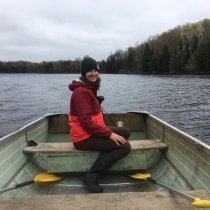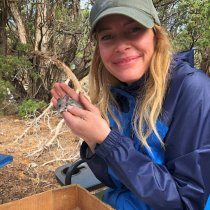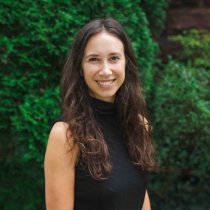Spotlight
Women in Ecology – Mary Lofton
November 13, 2024
In many of our Women in Ecology interviews, we find a recurring theme of the importance for mentorship in early career stages and a need for passion in your chosen field. This latest interview is no different.
We spoke with Dr. Mary Lofton, a postdoctoral research associate in the Center for Ecosystem Forecasting at Virginia Tech. As a child, Lofton learned to appreciate natural resources, which shaped her values along her career path. Here, she shares her non-linear ecology journey, what she likes the most about being an ecologist, and the impacts she hopes to continue to make within the field of ecology.
Can you tell us about your current role and what inspired you to become involved in your research?
Growing up in a rural area, I loved being outside. I found it peaceful and rejuvenating, as well as fun and inspiring. I love hiking and exploring; maybe it’s because I grew up in a rural area, but I always understood that we depend on natural resources, and therefore their conservation is important.
I was not into STEM as a student, initially. I was really interested in liberal arts and taking language and history classes, so I went to a liberal arts college. When I got there, I started to think about possible career paths, and knew I wanted to work outside at least some of the time. So, I wanted to major in something that would give me the opportunity to do that, and I thought biology would be a good choice.
After college, I went on to teach biology and environmental science as a high school teacher for several years and loved it. I credit the enthusiasm of my students for motivating me to learn more about freshwater science, because they got really interested in the care and conservation of freshwater resources. Because many environmental science topics are politicized in the United States, it can be a difficult area to explore with high school students who are all from different backgrounds. But I found that talking about preserving secure, safe access to freshwater resources for everyone and keeping our lakes, streams, and rivers healthy really unified them. Teaching these topics led me to graduate school, where I focused my Ph.D research on phytoplankton ecology in lakes and reservoirs.
Currently, I’m a postdoctoral research associate and will soon be transitioning into a research scientist position in the brand-new Center for Ecosystem Forecasting (CEF) at Virginia Tech. Within the center, I help to develop water quality models and forecasts for lakes and reservoirs. I also create educational materials for undergraduates and community college students to learn about ecosystem and water quality forecasting.
What really excites me about my work at the Center for Ecosystem Forecasting is that we’re applying a predictive mindset to ecosystem science to help people make decisions about water resources. Just as you would check the weather forecast on your phone to decide whether or not to wear rainboots, we aim to provide forecasts of ecosystems that lake and reservoir managers could refer to when they're making decisions about water quality management.
What keeps you motivated in your ongoing studies and dedication to this field?
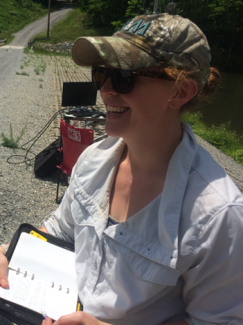
Lofton record-keeping during a water quality forecasting field workshop at Falling Creek Reservoir, Vinton, VA. Photo credit: Ryan McClure
I find it important to stay focused on the positives. For ecologists, it’s very easy to get sucked into environmental “doom and gloom” because there’s a lot of concerning news in terms of biodiversity loss, land use, climate change, etc., which we all acknowledge is happening. But if you focus on the negatives too much you get demotivated, and it becomes difficult to want to do anything to make progress.
For me, it’s about focusing on the wins or the positives – even if they are small! This can be, for example, an “aha!” moment that a student has in an ecology class and seeing their excitement and enthusiasm about learning something for the first time. As another example, during my Ph.D., I was partially funded by the Western Virginia Water Authority through a long-term partnership between the water authority and Virginia Tech. I communicated weekly with the reservoir managers at my field study sites, and I learned a lot about how the reservoirs were operated as supply for drinking water; it helped me feel that my research mattered in the community. Outside of work, I try to seek out communities that are celebrating the positive ways we can interact with the natural world – for example, I participate in a local community-supported agriculture (CSA) program and really enjoy the community around that.
What is the most fun part about being an ecologist and what is the most challenging?
I love the variety that comes with the different functions of my job. I love going outside to work or teach and I find that really energizing. It’s usually energizing for students too, and the outdoor setting allows you to see a livelier side of them as opposed to sitting in a lecture hall all the time.
That said, my role doesn’t currently involve a lot of in-person teaching or field work. I focus on computer modeling and simulation of ecosystems, as well as the development of educational modules for undergraduates that teach key concepts in data science and ecological forecasting, which are built using NEON data. I think I have two favorite aspects of my job right now. The first is that because our research group is highly collaborative, I have the opportunity to assist with mentoring of graduate students by, for example, helping them to debug their code or providing feedback on presentations and manuscripts. It’s really rewarding to feel that you’ve helped someone move a research project forward. Part of the reason our group is successful in fostering this type of collaborative culture is that we have developed authorship guidelines and expectations to ensure that contributions by all members of the group, ranging from undergraduates to full professors, are recognized with co-authorship when their contributions merit that.
My other favorite aspect of my job is the “big reveal” that happens when, after coding up an ecological model and troubleshooting all the bugs and running all the simulations, you finally get to compare your model predictions or forecasts to observations and see how well the model performed. If the model performed well, that’s worth a celebration, and if it didn’t, you have an opportunity to learn something interesting about why it didn’t perform well. It’s fun to try to recreate what we’re able to observe in nature and to see how well we can capture ecosystem processes in a model or what we can learn from that experience. It’s almost like gamifying research.
What challenges have you faced in the field of STEM, what advice would you give?
I think there’s a misconception that there is a linear path to entering STEM fields, and that you need to have a lot of pre-requisites completed before entering, such as calculus classes, physics, whatever it may be. That can present an intimidation barrier. I would say that your path into STEM does not have to be linear. I started as a high school teacher and then went to graduate school to make a career transition into ecological research. I’ve taken very few formal courses in math or statistics, but I now use math and statistics skills every day in my job. You can pick things up along the way. I would encourage people to focus on how you can build your skills as you go on in your job.
I would also say that strong women mentors and advocates in ecology are important. It’s been really powerful to see people I can relate to who are one step or several steps ahead of me in their careers.
Are you confident that the scientific community will be able to solve the world's biggest ecological issues? What barriers do you think need to be removed in order to do so?
There is no way we can possibly solve ecological challenges as a scientific community in isolation. We are going to have to engage policymakers, natural resource managers, tribal leaders, religious leaders, and the public. Everyone needs to come together for that kind of effort.
To do this successfully, ecologists have to ask ourselves: how are we interfacing with all those different groups in a way that we can hear their needs, priorities, and the knowledge that they share so we can incorporate it into our research? And then how are we communicating that research back out in a way that’s usable for those groups? This transdisciplinary, iterative process involves a lot of soft skills and work that is not traditionally recognized or used to assess career success in STEM. However, it’s absolutely needed if we want to solve ecological problems in addition to publishing research papers.
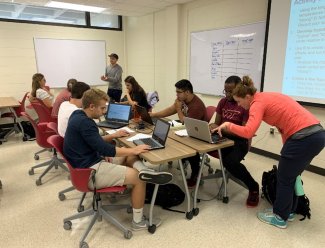
Lofton instructing students who are working on a Macrosystems EDDIE module at Virginia Tech. Photo credit: Cayelan Carey
What do you hope to do in your field in the future? Are there any specific areas of research that you would like to work more on or see more investment?
One impact I hope to have long term is through the modules I’ve developed as part of the Macrosystems EDDIE educational program to teach data science and ecological forecasting to undergraduates using NEON data. It’s rewarding to receive an e-mail from an instructor that you’ve never met that says, “Hey, I’ve been using Macrosystems EDDIE modules in my class and they’re great, but I have a question, can you help me out?” To me, it’s very motivating to realize that the modules are being picked up and used by instructors who we may not even know. I think that speaks to the impact of the program, and we’ve shown that the educational materials we’re developing with NEON data can be used to increase the confidence of both students and instructors related to quantitative skills and use of long-term, high-frequency datasets in ecology.
Having NEON data available for use in our educational modules has made them more broadly relevant to students across the continent. It’s easier to relate to a lesson when the data used in the lesson are from a place near where you live or somewhere that you’ve visited, and because NEON sites are located throughout the United States, it’s likely that U.S. students will be able to relate to at least one of the sites we focus on in the modules. I think they are a great example of how data from NEON can be integrated into undergraduate curricula and enhance learning outcomes for students of ecology.

